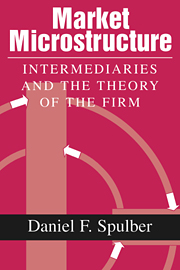Book contents
- Frontmatter
- Contents
- Preface and acknowledgments
- Introduction
- Part I Market microstructure and the intermediation theory of the firm
- Part II Competition and market equilibrium
- Part III Intermediation versus decentralized trade
- Part IV Intermediation under asymmetric information
- Part V Intermediation and transaction-cost theory
- 9 Transaction costs and the contractual theory of the firm
- 10 Transaction costs and the intermediation theory of the firm
- Part VI Intermediation and agency theory
- Conclusion
- References
- Index
9 - Transaction costs and the contractual theory of the firm
Published online by Cambridge University Press: 18 December 2009
- Frontmatter
- Contents
- Preface and acknowledgments
- Introduction
- Part I Market microstructure and the intermediation theory of the firm
- Part II Competition and market equilibrium
- Part III Intermediation versus decentralized trade
- Part IV Intermediation under asymmetric information
- Part V Intermediation and transaction-cost theory
- 9 Transaction costs and the contractual theory of the firm
- 10 Transaction costs and the intermediation theory of the firm
- Part VI Intermediation and agency theory
- Conclusion
- References
- Index
Summary
Economists have long been aware of the costs of operating a market system. Friedrich A. Hayek spoke of “the unavoidable imperfection of man's knowledge and the consequent need for a process by which knowledge is constantly communicated and acquired.” The decentralized nature of markets provides an efficient means of handling the vast amount of widely dispersed information. A central planner is incapable of acquiring such private information, and even if such information were available, making use of it would be prohibitively costly. The price system is a marvel because it offers what Hayek (1945, p. 527) termed “an economy of knowledge,” even though its “adjustments are probably never ‘perfect’.”
From a different perspective, Kenneth Arrow (1963) observed that “the failure of the market to insure against uncertainty has created many social institutions in which the usual assumptions of the market are to some extent contradicted.” In his discourse on medical care, Arrow (1963) stressed the problems health insurers encounter that are due to moral hazard and adverse selection in the demand for medical care. He concluded that
The logic and limitations of ideal competitive behavior under uncertainty force us to recognize the incomplete description of reality supplied by the impersonal price system.
For example, he suggested that the relationship between doctor and patient provides some amelioration of the effects of moral hazard on health insurance companies. Concern over the economic effects of moral hazard and adverse selection inspired work on principal-agent models of the firm, which I turn to in Chapters 11 and 12.
- Type
- Chapter
- Information
- Market MicrostructureIntermediaries and the Theory of the Firm, pp. 229 - 255Publisher: Cambridge University PressPrint publication year: 1999



